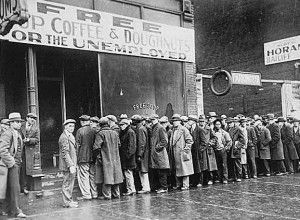AB 10 would boost CA minimum wage
by Katy Grimes | July 17, 2013 8:55 am
SACRAMENTO — Obamacare is forcing businesses to slash the working hours[1] of many employees below 30 hours a week. But the workers will be hurt even more in California as Democrats push into law Assembly Bill 10[2], by Assemblyman Luis Alejo, D-Salinas. It increases the state minimum wage from $8 an hour to:
* $8.25 an hour in 2014.
* $8.75 an hour in 2015.
* $9.25 an hour in 2016.
* $9.75 an hour in 2017.
* $10 an hour in 2018.
Why increase the minimum wage?
Ask business owners what their response will be if the government increases the minimum wage, and most will tell you they will be forced to reduce employees’ hours, slash schedules, reduce benefits, and even make decisions not to hire any more employees. The businesses able to compensate by raising prices know they are passing along a cost increase to the consumer, and also know this comes with reduced sales in many cases.
The bottom line is someone — the worker, consumer or business owner — is going to pay for this unnatural and forced cost increase.
According[3] to Alejo, minimum wages have not kept pace with the cost of living, reducing the workers’ purchasing power. In the bill analysis, Alejo said that, while the cost of goods and services increases every year, the purchasing power of minimum wage workers has been decling. “We have created a system where we pay workers less but need them to spend more. That causes middle class families to fall down the economic ladder. It’s the reason our middle class is shrinking and our income gap is now wider than ever,” Alejo said.
The California Labor Federation, the bill’s sponsor[4], says this bill will strengthen and depoliticize California’s minimum wage. According to CLF, “Not only are those at the bottom of the wage scale mired in poverty, over recent decades the real value of their earnings has collapsed,” leaving workers worse off today.
California’s sputtering economy
California unemployment rate has been improving, but still was the sixth-worst [5]in the country among the states at 8.6 percent. And a minimum wage that easily could be paid in expensive San Francisco simply will mean mass firings in depression-stricken Imperial County, where unemployment remained at 22.8 percent in May[6].
Any increase in minimum wage will negatively impact any economic recovery by either limiting available jobs, or worse, creating further job loss.
A study conducted by the NFIB Research Foundation[7] found the expected job loss by 2023 as a result of AB 10 will range from 48,000 to 68,000 jobs, “depending on the annual rate of inflation.”
“Unfortunately, the results of this study on the effect of Assembly Bill 10 aren’t a total surprise,” said NFIB/CA Executive Director John Kabateck. “Our members have been telling us for years that they cannot afford extra costs to their bottom line with the current business climate in California.”
“The news that more than 63 percent of the 68,000 lost jobs would be from small businesses is a terrifying prospect,” added Kabateck. “Our small business members continue to be pessimistic about the economy and job creation. The passage of legislation like AB 10 would only suppress any plans they have to hire and grow their businesses.”
Research on the minimum wage
The federal minimum wage originated in the Fair Labor Standards Act signed by President Franklin Roosevelt on June 25, 1938. Since 1938, the federal minimum wage has been raised more than 20 times.
According to the Bureau of Labor Statistics[8], in 2012, there were 3.6 million hourly paid workers in the United States with wages at or below the federal minimum wage of $7.25 per hour. That’s 75 cents below California’s current $8 minimum wage.
“Minimum wage workers tend to be young,” the BLS said[9]. “Although workers under age 25 represented only about one-fifth of hourly paid workers, they made up about half of those paid the federal minimum wage or less.”
“Among employed teenagers paid by the hour, about 21 percent earned the minimum wage or less, compared with about 3 percent of workers age 25 and over.”
Most of today’s minimum wage earners are teenagers, young adults and adult women who work at the minimum wage because they are entry-level workers, are unskilled, have limited work experience, or work part-time. When they first enter the work force, the minimum wage pay is appropriate. However, once these entry-level workers gain experience, hard work and new abilities are quickly rewarded with higher pay — particularly in California’s stressed labor market.
Why would lawmakers support this when half of the 3.6 million minimum wage workers are young people?
Decades of economic research has shown that minimum wage increases usually end up harming low-wage workers by stifling job opportunities when employers react. Specifically, minimum wage increases hurt the low-skill workers, youth and minorities — groups that lawmakers are often trying to help with these policies.
But Assemblyman Alejo steadfastly claims[10] there’s been no adverse impact to jobs when the minimum wage is increased.
AB 10 is currently in the Senate Appropriations Committee.
- forcing businesses to slash the working hours: http://www.forbes.com/fdc/welcome_mjx.shtml
- Assembly Bill 10: https://leginfo.legislature.ca.gov/faces/billAnalysisClient.xhtml
- According: http://www.leginfo.ca.gov/pub/13-14/bill/asm/ab_0001-0050/ab_10_cfa_20130422_121314_asm_comm.html
- the bill’s sponsor: http://www.leginfo.ca.gov/pub/13-14/bill/asm/ab_0001-0050/ab_10_cfa_20130422_121314_asm_comm.html
- was the sixth-worst : http://www.bls.gov/web/laus/laumstrk.htm
- 22.8 percent in May: http://research.stlouisfed.org/fred2/series/CAIMPE5URN
- study conducted by the NFIB Research Foundation: http://www.nfib.com/nfib-in-my-state/nfib-in-my-state-content?cmsid=62400
- Bureau of Labor Statistics: http://www.bls.gov/opub/ted/2013/ted_20130325.htm
- BLS said: http://www.bls.gov/opub/ted/2013/ted_20130325.htm
- steadfastly claims: http://www.leginfo.ca.gov/pub/13-14/bill/asm/ab_0001-0050/ab_10_cfa_20130422_121314_asm_comm.html
Source URL: https://calwatchdog.com/2013/07/17/ab-10-would-boost-ca-minimum-wage/
